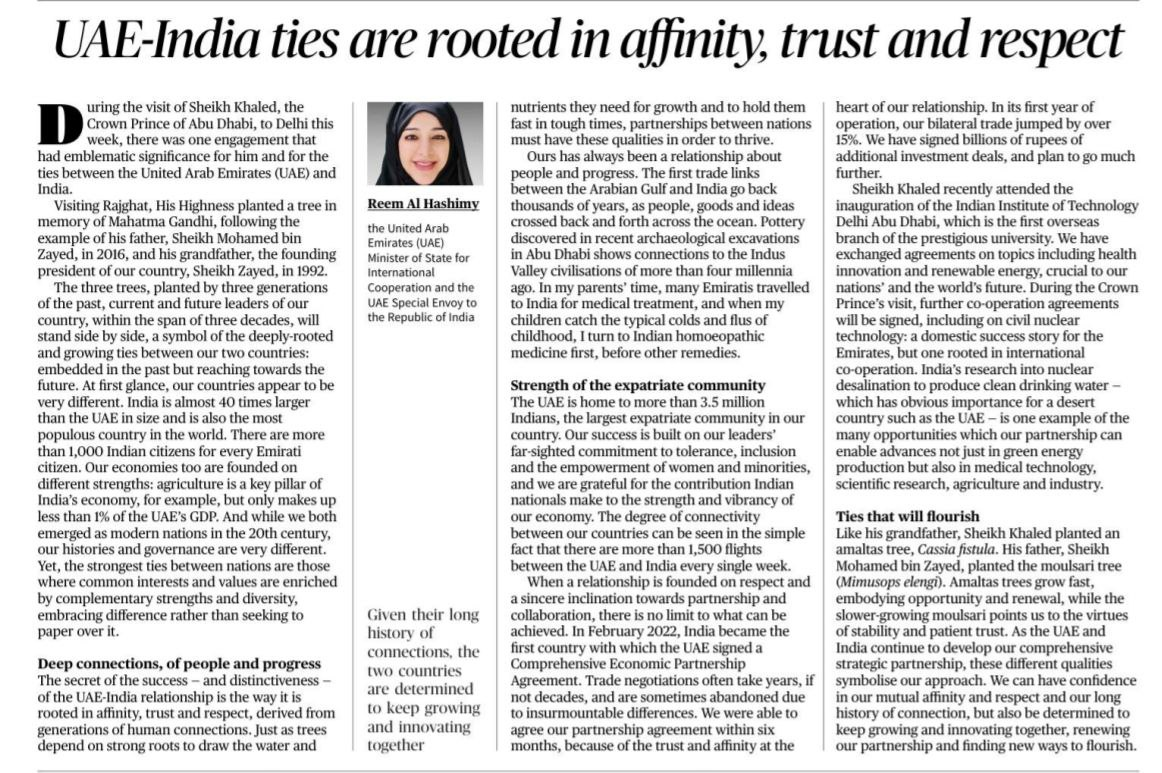UAE-India Relations
Introduction:
The relationship between India and the United Arab Emirates (UAE) is built on deep-rooted historical connections, trust, and mutual respect. The ties have evolved from cultural and trade exchanges over millennia to a comprehensive strategic partnership that spans areas like economy, defense, technology, and expatriate communities.
- Historical Context:
- Trade links between the Arabian Gulf and India date back thousands of years, with evidence found in archaeological excavations.
- Cultural exchanges have flourished, and in recent history, many Emiratis have relied on India for medical treatment, showing a close connection between the peoples of both nations.
- Economic and Strategic Cooperation:
- The UAE is home to more than 3.5 million Indians, making it the largest expatriate community in the Gulf.
- Bilateral trade grew by over 15% in the first year of the Comprehensive Economic Partnership Agreement (CEPA), signed in February 2022.
- India and UAE collaborate in areas like renewable energy, nuclear technology, and health innovation. India’s advances in nuclear desalination have critical importance for UAE’s water security.
- The two countries have signed several investment deals, with plans for further cooperation.
- Cultural and Human Connection:
- The strength of the partnership is not only based on strategic needs but also on the human connection and shared values.
- Indian culture, food, and even homeopathic medicine have become integrated into Emirati daily life.
- Both nations value tolerance, inclusion, and the empowerment of women and minorities, ensuring their partnership is not just economic but also social and cultural.
- Bilateral Visits and Future Prospects:
- Recent high-level visits, like that of Crown Prince Sheikh Khaled, have furthered the relationship.
- New agreements on nuclear energy, health innovation, and advanced technology are in the pipeline.
- The Indian Institute of Technology (IIT) Delhi Abu Dhabi represents a significant step toward academic collaboration.
Conclusion:
India and UAE have built a relationship based on mutual respect, shared values, and economic cooperation. With a focus on expanding this partnership into new areas of innovation and technology, the future looks promising for further growth. Both nations continue to explore new avenues to strengthen their bond, with the goal of achieving prosperity for their people.
Mains Practice Question:
|
Q: The India-UAE relationship has evolved into a strategic partnership rooted in shared interests, trust, and mutual respect. Discuss the key areas of cooperation and the prospects for further deepening the ties.
|
2024 China-Africa Summit (FOCAC)
Introduction:
The Forum on China-Africa Cooperation (FOCAC), initiated in 2000, has evolved into a key platform for dialogue, interaction, and partnership between China and Africa.
The ninth Ministerial Conference, held in Beijing, reaffirmed China’s commitment to fostering deeper ties with African nations across various sectors, including economic development, security, and global governance.
- Historical Context and FOCAC’s Importance:
- FOCAC is a crucial mechanism through which China and Africa engage diplomatically and economically.
- China’s long-standing strategic interest in Africa is driven by a desire for cooperation, particularly in infrastructure development, energy resources, and security.
- African countries, while cautious of certain Chinese practices, find value in enhancing proximity to China.
- Key Outcomes of the 2024 Summit:
- Economic Synergy: The focus of the summit is aligned with China’s initiatives for a Shared Future and fostering Synergy between Belt & Road Initiative (BRI) and African development agendas like the African Continental Free Trade Area (AfCFTA).
- Debt Relief and Financial Participation: China aims to boost African participation in international finance through debt treatment initiatives and commercial reforms, reflecting its long-term engagement goals.
- Technological and Strategic Collaboration: Chinese plans such as Global Development Initiative (GDI), Global Security Initiative (GSI), and Global Civilization Initiative (GCI) were embedded into the overall strategic goals for Africa, focusing on strengthening African security, digital growth, and modernization.
- Areas of Development and Collaboration:
- Infrastructure and Modernization: China plans to support Africa’s independent peace operations and security challenges through funding and joint initiatives in infrastructure, technology, and defense.
- Trade and Tariff Reforms: The focus on tariff reductions aims to boost African exports to China, facilitating economic growth. This is in line with China’s support for the African Union joining the G20.
- Capacity Building in Education and Health: China is increasing its engagement in social sectors, promoting projects in education and health across African nations, providing scholarships, and encouraging cultural exchanges.
- Challenges and Criticisms:
- Debt Diplomacy Concerns: Critics argue that while China presents itself as a partner for African development, there are risks related to debt traps and heavy reliance on Chinese loans.
- China’s Role in Global Leadership: Some African leaders express concerns that China’s Africa policy might align more with its global strategic interests rather than purely developmental goals.
- Western Counter-narratives: The growing influence of China in Africa has raised concerns in Western countries, especially the U.S. and the EU, regarding China’s expanding geopolitical footprint.
- The Role of India in Africa:
- India’s Africa policy has lagged behind that of China’s despite shared historical ties and a significant diaspora.
- India could strengthen its influence by focusing on development assistance, technology transfers, and multilateral cooperation in areas like education, agriculture, and security.
Conclusion:
The 2024 China-Africa Summit reiterates the deepening ties between the two regions, as China continues to be a significant player in Africa’s economic and strategic development.
However, the summit also underscores the importance of balancing Chinese influence with African agency and global participation.
For India, this presents both a challenge and an opportunity to increase its engagement in Africa and offer alternative models of partnership.
Mains Practice Question:
|
Q: The China-Africa Forum (FOCAC) has been instrumental in shaping Africa’s economic landscape. Discuss the significance of the 2024 summit and how India can enhance its role in Africa in response to China’s growing influence.
|



